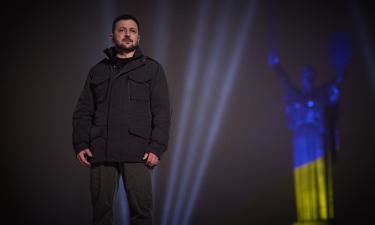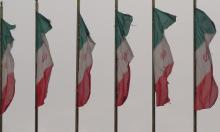Surgeons fight for Sharon’s life
Prime Minister Ariel Sharon was sent back to the operating room Thursday for further surgery to save his life after he suffered "massive, widespread" bleeding in his brain that doctors feared would cause permanent damage. Vice Premier Ehud Olmert was named acting prime minister and given a beefed-up security detail. He met with key members of Sharon's staff early Thursday and convened the Cabinet for a special session at 9 a.m. (0700 GMT). Close Sharon associates said they did not expect him to return to office.
Sharon's stroke threw Israeli politics and diplomacy throughout the region into turmoil in the midst of election campaigns for both the Palestinians and Israel. The premier had been expected to easily win re-election in March at the head of the moderate Kadima Party he created to free his hands for further peace moves with the Palestinians.
Many Israelis see Sharon, an overweight, 77-year-old war hero and longtime hawk who change tack and withdrew from the Gaza Strip last year, as the best hope for achieving a peace deal with the Palestinians. His illness would create a power vacuum in the government and cloud the electoral prospects of his party, which was built around Sharon.
Sharon fell ill at his ranch Wednesday evening and was rushed to Hadassah Hospital in Jerusalem, where doctors put him on a respirator and began lengthy emergency surgery about midnight. Doctors said Thursday morning that they had stopped the bleeding during nearly seven hours of surgery, but Sharon was being sent back to the operating room because a brain scan showed he required more treatment.
"We are continuing with the same operation, and there are more areas that need to be treated," Dr. Shlomo Mor-Yosef, the director of Hadassah Hospital, said without elaborating. Surgery apparently had been complicated by blood thinners Sharon took following a mild stroke Dec. 18. The medication may also have contributed to Wednesday's stroke. Sharon originally had been scheduled to undergo a procedure Thursday to seal a hole in his heart that contributed to the initial stroke.
Mor-Yosef did not address Sharon's prognosis, but neurosurgeons not involved in Sharon's treatment said a full recovery was not likely following such a massive stroke. They said it usually takes at least a day after surgery to determine the extent of any damage. Aides to Sharon said they were working on the assumption he would not return to work. "It is very clear that we will not again see Sharon serving as the prime minister," said an Israeli Cabinet minister, who declined to be named because of the sensitivity of the situation.
Palestinian officials said they were concerned the uncertainty in Israel could overshadow their campaign for Jan. 25 elections. Two U.S. envoys were to have met with Sharon on Thursday evening, apparently to urge Israel to reverse a decision to ban Palestinian voting in disputed Jerusalem. Palestinian leader Mahmoud Abbas has said he may not hold elections if Jerusalem, claimed by the Palestinians as a capital, is excluded.
"We hope thatthis (Sharon's illness) will not affect what we had expected of the Israelis," said Palestinian negotiator Saeb Erekat. If Olmert puts off a decision on Jerusalem, "it means the Palestinian election is going down," Erekat said.
Israelis and world leaders expressed concern and offered prayers for Sharon.
In a statement, U.S. President George W. Bush praised Sharon as "a man of courage and peace," saying he and first lady Laura Bush "share the concerns of the Israeli people ... and we are praying for his recovery." Israeli Chief Rabbi Yona Metzger called on Israelis to read Psalms and pray for Sharon. "We are very, very worried," he said, and prayed for "mercy from Heaven."
Pan-Arab satellite television broadcasters beamed out largely straightforward, nonstop live coverage from outside the hospital where Sharon, a particularly despised figure among many Arabs, struggled for his life. Ahmed Jibril, a radical Palestinian leader in Damascus, Syria, called the stroke a gift from God.
Speaking to reporters outside the hospital, Sharon aide Raanan Gissin warned Israel's enemies: "To anyone who entertains any notion to try and exploit this situation ... the security forces and IDF (Israeli military) are ready for any kind of challenge," he said.
But a Palestinian commentator on the Saudi-owned Al-Arabiya network offered Sharon unexpected praise as "the first Israeli leader who stopped claiming Israel had a right to all of the Palestinians' land," a reference to Israel's Gaza withdrawal. "A live Sharon is better for the Palestinians now, despite all the crimes he has committed against us," said Ghazi al-Saadi.
Sharon's personal physician, Dr. Shlomo Segev, said early Thursday that he expected Sharon to emerge from surgery "safely." But outside doctors said chances of recovery were slim, especially because of the length of the surgery.
"For them to have to go back in twice, that's not good," said Dr. Emil Popovic, at neurosurgeon at Sir Charles Gairdner Hospital in Perth, Australia.
"The chances of him getting back to prime minister again would be virtually zero," he said. "At 77, not too many people make a good recovery from a brain hemorrhage. So, it doesn't look very good for him."
According to Israeli law, Olmert, as vice premier, assumed the post of acting prime minister for 100 days. An election will be held in that time, apparently as scheduled on March 28. If Sharon should die, the Cabinet would choose a replacement, said legal analyst Moshe Negbi.
Sharon has been prominent in Israeli life for more than five decades. He first rose to prominence as an army officer, setting up a unit that fought Palestinian infiltrators in the 1950s. Advancing through the ranks of the army, he served as commander of the Gaza region after Israel captured the territory in the 1967 war. Sharon left the military for politics, forging the hardline Likud Party, before returning briefly to the army during the 1973 Mideast war. Likud came to power in 1977, reports the AP. I.L.
Subscribe to Pravda.Ru Telegram channel, Facebook, RSS!




